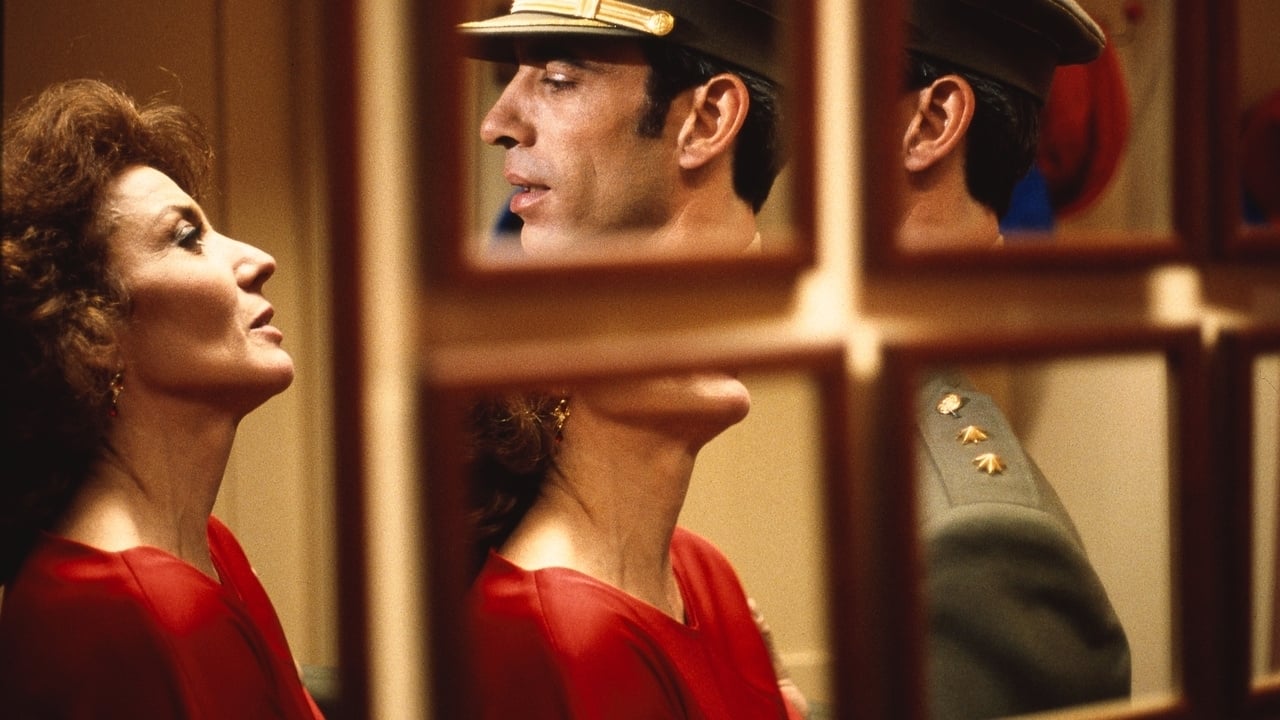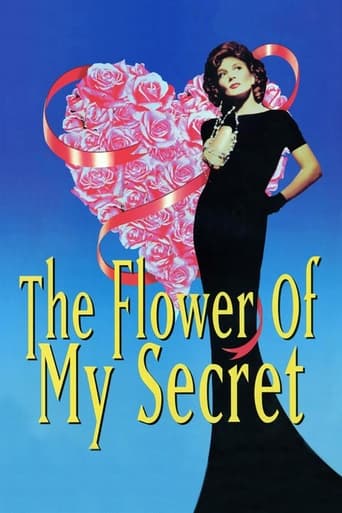

Dreadfully Boring
... View MoreAdmirable film.
... View MoreThis is one of the few movies I've ever seen where the whole audience broke into spontaneous, loud applause a third of the way in.
... View MoreThis is a gorgeous movie made by a gorgeous spirit.
... View MoreI'd travel half a day to see one of his films properly projected. Even though some of his fantasies are hard to connect to, he would never fail to deliver on the cinematic front. Most viewers think the story here too melodramatic and simple. It does not seem so to me. It has multiple, contradictory nestings. It has metacharacters that temporarily settle on one character or another. It has deeply accessible feminine emotions (at least by film standards), and they are allowed to go down narrative blind alleys like life has it. It has inner film, here in the form of romance novels (and war).We never really know when we are swimming in life or an image of life created in one of the fictions of the characters.But the value is never in the story, it is in how the emotional space is conveyed visually. It is hard to carry a fresh impression of an Almodovar film over the years; those impressions saturate the soul as intended. So I cannot say with authority that this is at least as amazing as his best ("Talk"). It sure seems so; there are several shots that made me watch this three times in a row.Some are a bit too literal for my taste, like the scene that accompanies her madness (med students protesting about sex in the street), or her breakup (bouncing marbles). But I expect these from Pedro. Here is an example of the better kind, an amazing shot at about 55 minutes in. Our authoress leads a double, double life. In her first full dip, she encounters her second publisher (and later ghost) who himself has a pseudonym. The shot is through a staggered glass wall. She is out of sight but there are four reflections of her, two of which are superimposed on him and his reflection. (He invites her to a screaming contest.) It is astonishing. You should know that I see four distinct layers of her being in the narrative here; it is a standard for the women in his later films.Another shot: she has been rescued by her ghostwriter and wakes up in a strange place we don't initially know. It is his bed we later discover. Our establishing shot is through a window over the bed to a several story high billboard of her latest book on a famous store's front. This is a book that she does not yet know exists. Only later do we see that the location is through a window, over a bed in his apartment with him nearby watching her in precisely the way we saw the billboard. But the remarkable thing is not that progression as well done a reveal as it is, but how it starts, with a confusing black and white blur. Only later do we discover what it was: the zebra curtains framing the window. His vision and words do this throughout his films, moving from frame to background to immersion in a reality that merges the foreground and background situations.The next major scene is a performance. We see her maid, unexpectedly as an accomplished dancer, in a seductive dance with her hunky son! It is deep and full of captured motion, though I think it would take a real Spaniard to get the full impression.We soon learn that he stole her last manuscript, one she did not like, and a film is being made of it. We know also, as loyal Pedro viewers, that the film is one of the layers of his work, a few layers of which we have just seen.Ted's Evaluation -- 3 of 3: Worth watching.
... View MoreFlor is one of Pedro's understated best. The incomparable Marisa Paredes gives this film its ultimate power. Her extraordinary face details every nuance of the loss of her marriage--"abandonment," as Sr. Almodovar labels it. The rich flamenco scenes reframe the passion and pain Marisa's character moves through during the film. And as nearly always, Sr. A. pays homage here to other works that have informed his vision--a barrage of brilliant and troubled women writers (Djuna Barnes, Dorothy Parker, Carson McCullers, et al.), and "Casablanca" and "Rich and Famous," for instance. I thank God for Pedro. Without him, life would be as the lyrics of the Bola de Nieve song in this film--"no me dejes vivir."
... View More"The Flower of My Secret" follows a middle-aged married woman and somewhat neurotic novelist, Leo (Paredes), on the verge of divorce from the handwriting on the wall to the separation to the final realization and adjustments required to get her life back on track. There's little plot to be found in this linear dramady which sees Leo bumping into the people in her life for brief tete-a-tetes and bouncing off her emotional walls as she tries to cope with the inevitable. Not Almodovar's best work, this busy, mildly humorous, dialogue-intensive contempo Spanish flick received mild approval from critical corners and the public alike. Short on story but very well composed, "The Flower of My Secret" will play best with women, especially Spanish speakers or foreign film buffs. (B)
... View MoreThe film famed for pivoting Almodovar's move away from formless farce to the rich delights of melodrama, which would produce his two masterpieces, LIVE FLESH and ALL ABOUT MY MOTHER. SECRET isn't quite up to those films (the mix of comedy and drama isn't quite digested) but is a wonderful start, with its amazing heroine, whose delusions and needs are revealed but never resolved; its typically eccentric supporting cast; its ruminations on the artist and her art - there are writers, editors, dancers, filmmakers all in the film - and secrets, both private and public; its silly men; its use of interiors and decor; Almodovar's still cherishable, unparalleled use of colour, allied with a new found sense of composition (the later films would reveal his increasing mastery of the camera); some extraordinary shots, especially the paper shower during the students' demonstration.
... View More